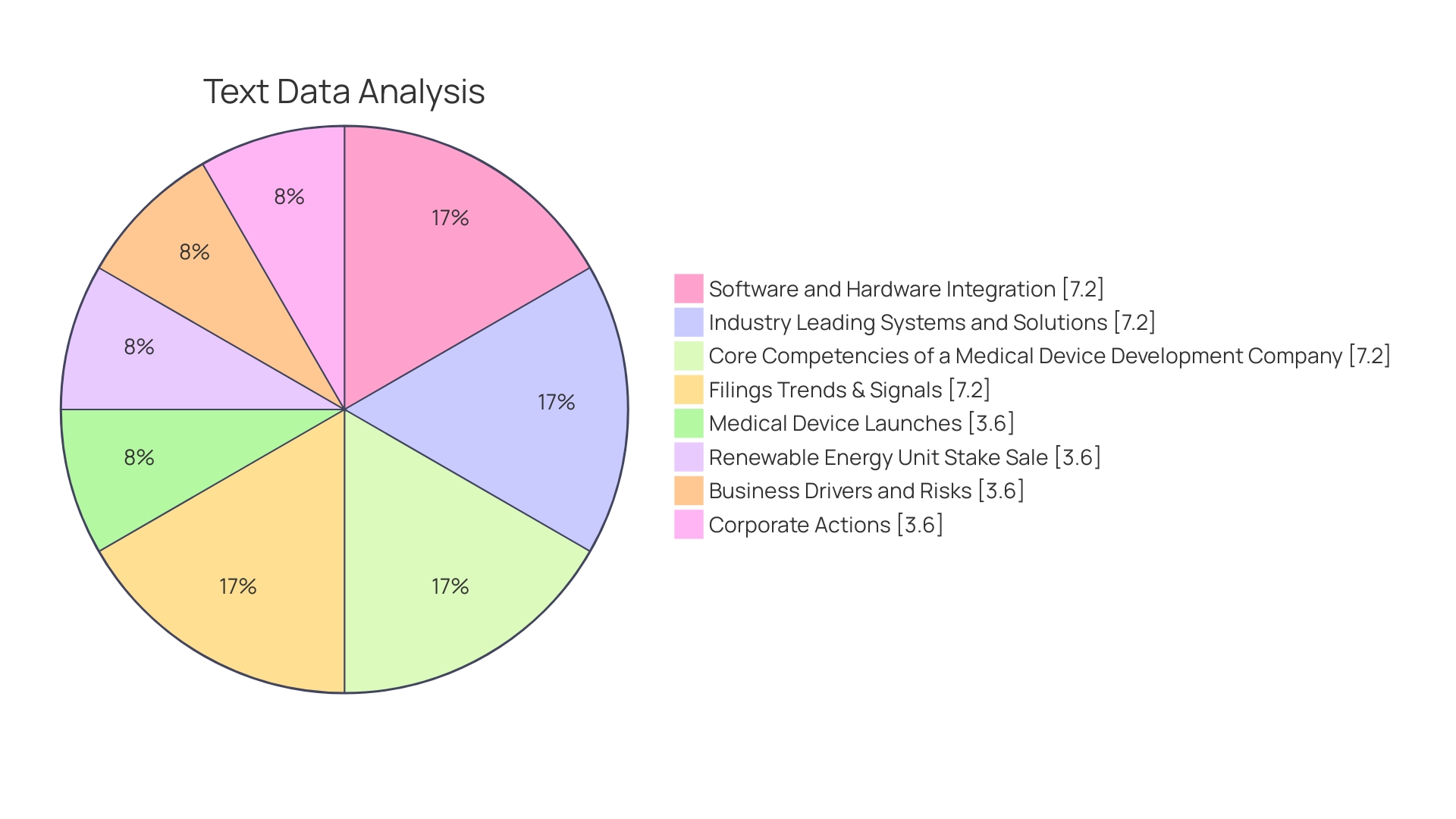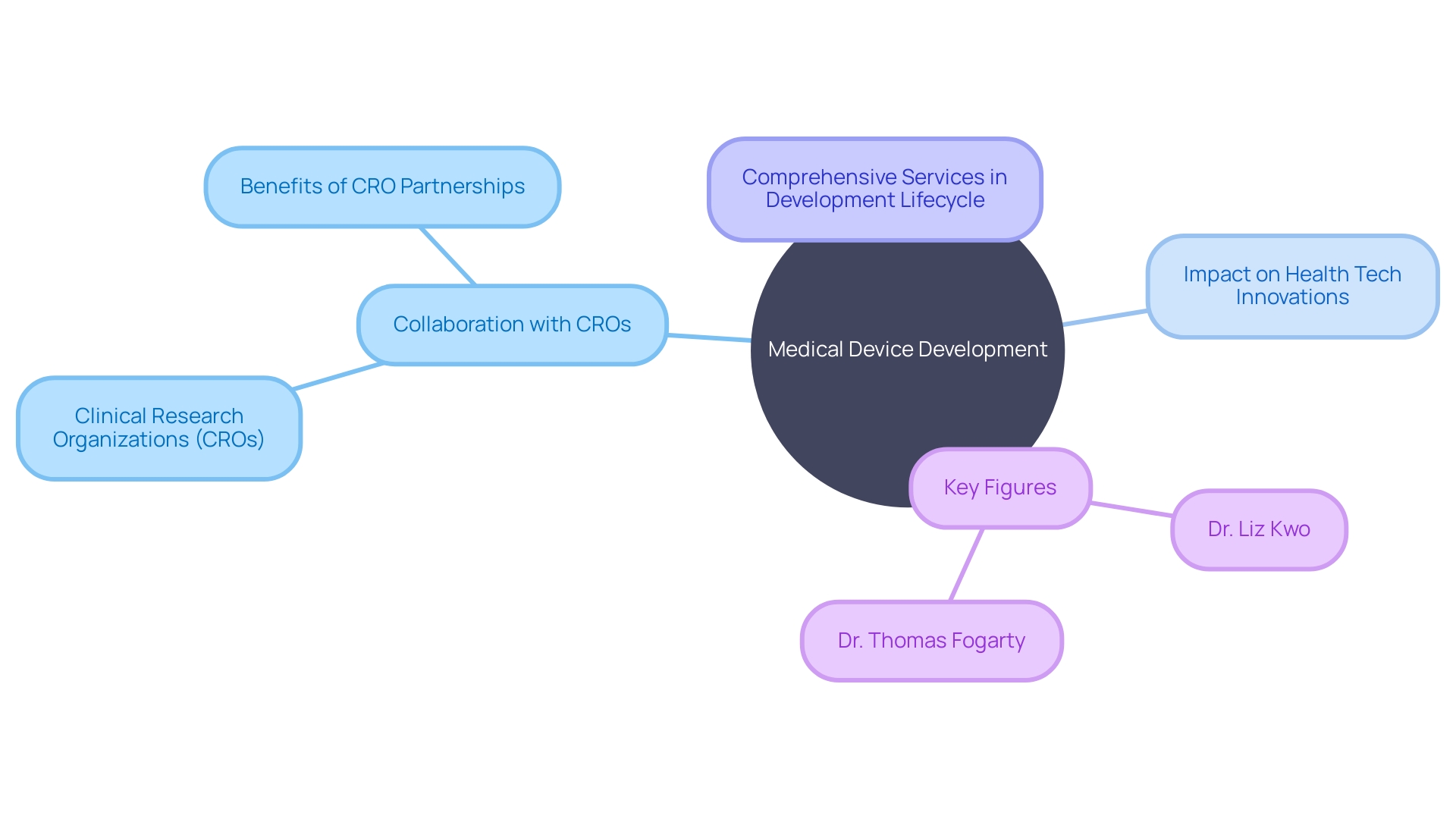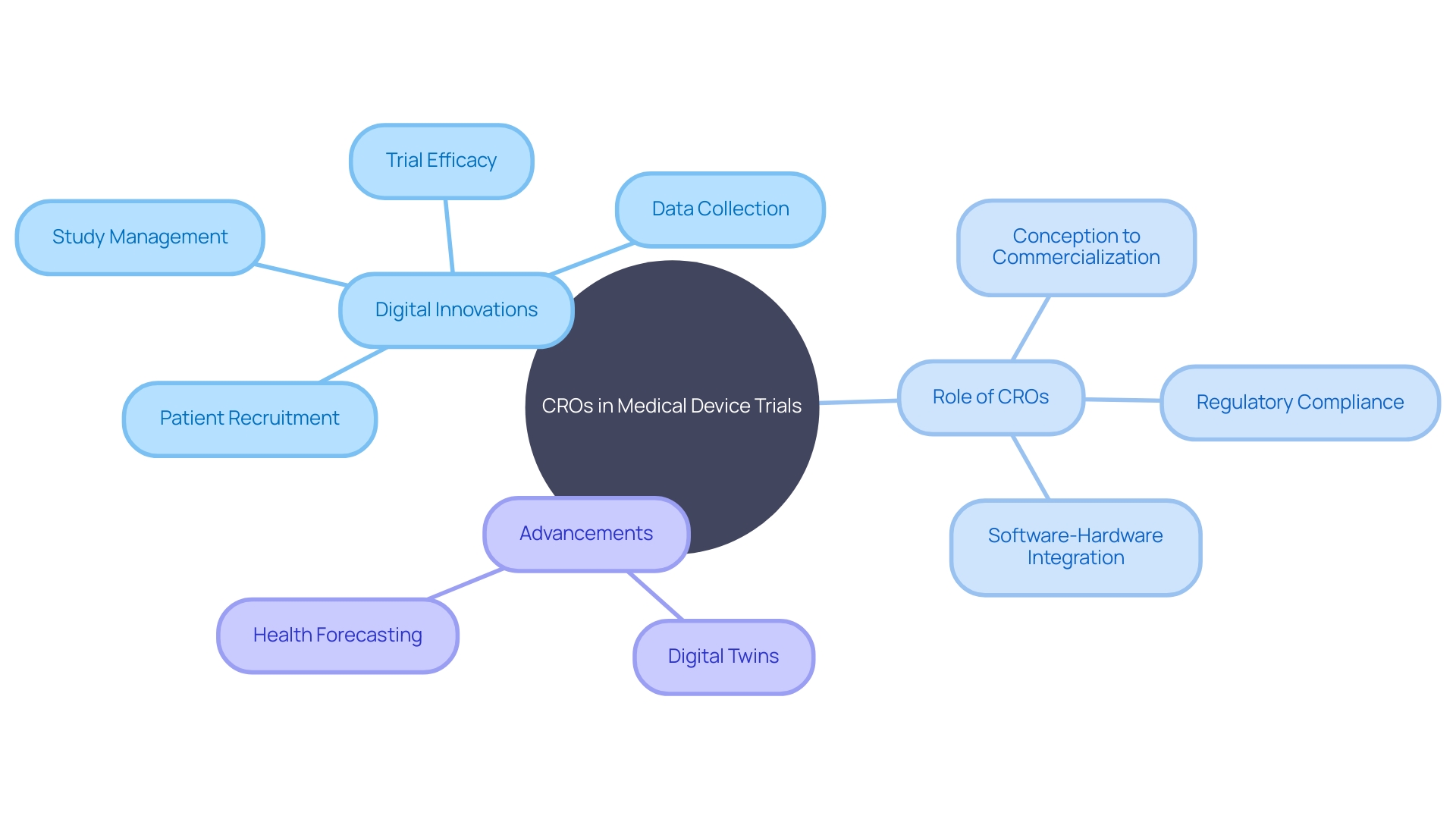Introduction
Medical Device Contract Research Organizations (CROs) play a crucial role in the development of medical devices, ensuring a seamless transition from concept to market launch. These organizations possess a deep understanding of the development process, offering technical expertise and navigating complex regulatory landscapes. By integrating cutting-edge technologies and collaborating with various healthcare stakeholders, CROs promote innovation and pave the way for improved patient outcomes.
The medical technology market is projected to reach substantial revenue generation, emphasizing the integral role of CROs in disease prevention, diagnosis, and treatment. In this article, we will explore the significance of CROs in advancing healthcare innovation, the benefits of partnering with CROs for medical device development, the impact on clinical trials and patient recruitment, the technological innovations employed by CROs, and future trends and challenges in this rapidly evolving sector.
What are Medical Device Contract Research Organizations (CROs)?
Medical Device Contract Research Organizations (CROs) offer invaluable services spanning the entire lifecycle of medical device development - from concept generation to market launch. With a deep comprehension of the intricacies within the development process, these organizations undertake a pivotal role by assuring a coherent transition between critical phases, thus contributing to time and cost efficiency as well as amplifying the prospects for success.
The selection of a Medical Device CRO is a decision that demands meticulous attention to a multitude of factors. Stakeholders in the healthcare industry prioritize partnering with companies that not only exhibit robust technical prowess but also an intricate understanding of the complex regulatory and market landscapes. These considerations are crucial since the developing company's role does not merely end at technical support; they are often vested with the responsibility to navigate the intricate network of healthcare stakeholders including patients, families, physicians, and regulators.
At the core of medical device development lies a dynamic process that integrates forward-thinking strategies with rigorous compliance with regulatory standards. With technology being a primary driving force, contemporary CROss integrate cutting-edge technologies to promote innovation and enhance patient outcomes. Among the waves of progress, concepts such as 'digital twins' have emerged, leveraging graphical models to predict future trends and aid in the development process.
As reported in recent news and by industry leaders, the inclusion of research in healthcare is not just beneficial for patient outcomes but also empowers the whole medical system. The successful implementation of new medical technologies relies not only on brilliant ideas but also on the collective acceptance by the community it serves.
Confirming the robust growth of the sector, statistics project substantial revenue generation in the medical technology market, specifically in the United States, with expectations to reach US$215.80 billion by 2024. This expansive market not only includes medical devices but also In Vitro Diagnostics (IVD), attesting to the integral role medical technology plays in disease prevention, diagnosis, and treatment.
In summary, Medical Device CROs are pivotal in facilitating the intricate journey of medical device development, underpinned by their expertise, adaptability to technological advancements, and their aptitude for navigating the healthcare ecosystem. Their role is ever more significant as they work hand in hand with myriad stakeholders to realize innovative healthcare solutions that promise a brighter future for patient care.

Role of CROs in Advancing Healthcare Innovation
Medical Device Contract Research Organizations (CROs) serve as the fundamental pillars in the healthcare innovation space by offering specialized resources, regulatory expertise, and an infrastructure tailored to meet the demands of new medical device development. Key factors such as homecare needs, early diagnosis, and the growing relevance of digital technologies including machine learning and 5G have spurred innovation, as seen in the more than 710,000 patents filed in the medical devices industry over the last three years. Notably, the lifecycle of these innovations often mirrors an S-shaped curve—a trajectory from inception through an acceleration in adoption, before maturing.
CROs underpin this innovation curve by spearheading large-scale clinical trials. A testament to their influence is seen in recent technological advancements, such as the Q-Pad by Qvin, which received FDA clearance in January 2024 as a novel blood sampling method and Cardiawave's venture into non-invasive cardiovascular therapy. Their capacity to amass comprehensive data underscores the safety and efficacy of such medical devices.
By partnering with CROs, medical professionals gain access to invaluable expertise, facilitating navigation through intricate regulatory frameworks, thus expediting the development pathway. Constant investment in cutting-edge methods and technology by CROss eclipses traditional approaches, driving enhanced clinical trial efficiency. A case in point is Vantis Vascular's purpose-built products, aiming to elevate patient outcomes in vascular procedures, reflecting the CROs' commitment to healthcare advancement.
A look into successful medical device cases, guided by the experiences of innovation leaders, stresses the importance of resilience, adaptability, and a profound comprehension of the healthcare ecosystem. One such voice, Dr. Thomas Fogarty, highlighted the significance of an idea's implementation and its acceptance by the healthcare community. Predictably, startups founded on these principles, as demonstrated in Lakka Health's initiatives, are likely to revolutionize common medical devices, challenging the status quo.
In essence, Medical Device CROs embody the convergence of entrepreneurship, technological progress, and multi-sector governance, shaping the future of medical innovation and ensuring that emerging devices fulfill both clinical and commercial potentials.
Benefits of Partnering with CROs for Medical Device Development
The collaboration with Clinical Research Organizations (CROs) in the realm of medical device development propels companies forward by capitalizing on the CROss integrated networks of investigators, healthcare sites, and diverse patient demographics. This broad access streamlines participant recruitment and augments enrollment efficacy. Immersed in healthcare ecosystems, CROss furnish expedient pathways to study cohorts, courtesy of their entrenched connections with medical professionals and facilities.
Moreover, CROs' prowess in orchestrating study designs, data stewardship, and statistician-led analyses translates into meticulously gleaned and interpreted evidence. Medical device companies thus stand to benefit from the CROs' resource pool, spurring savings in both temporal and financial investments. These synergies are also instrumental in navigating the rigorous compliance landscape, ensuring that clinical evaluation of medical devices adheres to the stringent demands of regulatory frameworks.
For example, Dr. Liz Kwo, Chief Commercial Officer at Everly Health, underscores the significance of early detection in managing chronic kidney disease, a stealthy health adversary affecting millions. The company's alliance with over a hundred enterprise clients exemplifies a successful CRO partnership model that emphasizes advanced diagnostic capabilities and remote-based care for disease interception. Similarly, cutting-edge technological applications like the CardiAQ device harness sophisticated AI algorithms alongside high-performance sensors, epitomizing the technological strides in medical device development.
The device’s attributes, including mobility, minimal installation prerequisites, and uncomplicated operation, underscore the impact of CROs in advancing health tech innovations.
From concept to commercialization, medical device development is a composite journey requiring expertise across multiple domains including engineering, regulatory know-how, and market assimilation. Entities seeking development partners are prudent to consider those offering an exhaustive suite of services, which inherently facilitates a coherent progression through the development lifecycle. This approach also effectively balances the multifaceted interests across the healthcare continuum — from patients to providers and from regulators to investors — as iterated by industry leaders such as Dr. Thomas Fogarty and highlighted in strategic partnership announcements.
Ultimately, the convergence of these developmental, operational, and strategic aspects delivered through CROss contributes vitally to the overarching success in the pursuit of novel medical device innovations.

Impact on Clinical Trials and Patient Recruitment
Contract Research Organizations (CROs) specializing in medical devices are transforming the landscape of clinical trials with their strategic approach to patient recruitment, study management, and data collection. These organizations excel at pinpointing appropriate patient groups for distinctive studies and tailoring recruitment tactics to enhance participation rates. This proficiency mitigates recruitment-associated costs and time, strengthened by the backdrop of examples like Chris, a seasoned biomedical engineer, who contributes deep expertise in managing complex studies for advanced medical devices.
In managing the life-cycle of a trial, CROss assure meticulous adherence to protocols, and through vigilant study management, they ensure the collection and analysis of data that upholds the integrity of trial results. Their engagement heightens the quality of clinical outcomes, and by doing so, streamlines the path for pioneering medical devices to advance into the marketplace. Innovations in Digital Clinical Trials (DCTs) also redefine participation accessibility, with remote technologies facilitating trial involvement beyond geographical limits, as expounded by Etienne Nichols, a forefront Medical Device Guru.
Faced with barriers that once limited patient participation, such as logistic hurdles experienced by a patient in rural Pennsylvania for an overseas trial, DCT solutions provide a new horizon of opportunity. CROs are at the vanguard of deploying these technologies, integrating wearables and IoT that enhance data precision and participant engagement while also optimizing cost-effectiveness. Real-world applications underscore this progress, exemplified by a Zelta CRO client using remote blood pressure monitoring to acquire real-time data in a virtual study, negating the need for on-site visits and marking a leap in trial efficacy.
Industry leaders understand that a track record of thriving product launches reflects a company's adeptness at traversing the intricate journey from conception to commercialization, particularly in a digital health-dominated age. The proficiency of medical device software development companies to seamlessly integrate software with hardware sets a new bar for competitive leadership.
The core competencies of a CRO extend beyond technical acumen to a profound comprehension of regulatory frameworks, ensuring that the transition from ideation to market is unimpeded. Projections like Karen Willcox's regarding digital twins hint at the future of health forecasting, reinforcing the relevance of advanced systems and solutions in medical device development.
As digitalization reshapes the medical device sector, it's paramount to discern between mere data conversion and intelligent digitalization that propels a company towards critical objectives. Conclusively, as we navigate a terrain ripe with digital therapeutics and embrace their potential to diminish patient costs and improve outcomes, the role of CROss in effectively harnessing digital innovations is pivotal.

Technological Innovations in CROs
Clinical Research Organization (CRO) specializing in medical devices relentlessly focus on harnessing cutting-edge technology to elevate their services and enhance the efficiency of clinical trials. These entities rely on innovative digital tools such as electronic data capture, remote monitoring solutions and wearable technology to expedite data collection and optimize trial management workflows. Embracing such technological breakthroughs facilitates real-time analytics and close oversight of trial activities, leading to improvements in the accuracy and timeliness of research outcomes.
This progressive integration of technology by CROss not only propels healthcare innovation forward but also provides indispensable support to researchers and enterprises aiming to pioneer safe and efficacious medical devices.
For instance, consider the significant advancements in algorithms and predictive models like HINT (hierarchical interaction network) and SPOT (sequential predictive modeling of clinical trial outcome), which forecast the success of clinical trials by evaluating drug properties, targeted diseases, and patient criteria. As clinical trials burgeon in size and complexity, such technology becomes crucial in managing the 3.6 million data points -- a threefold increase from a decade ago -- typically generated by a Phase 3 trial. Moreover, with medical data doubling every 70 days, CROss are geared up to accumulate, tend, and interpret massive datasets, thereby fostering heightened rates of successful outcomes.
Utilizing technology in clinical trials extends to patient engagement tools, sensors, and wearables that offer swift and consistent data generation, allowing for prompt patient updates and decreased chances of human error through manual data processing. The implications of technology in streamlining clinical trials are further highlighted by the potential use of commercial devices like smartphones and fitness trackers to automate data transmission. Additionally, the integration of electronic medical records into clinical trials paves the way for seamless data submission.
Furthermore, innovative bioelectronics, such as those being researched for transplant organ monitoring, underscore the potential of technology in improving patient outcomes. It is a testament to the power of modern-day CROs in revolutionizing the clinical research horizon, thereby assisting medical and pharmaceutical companies to navigate the meticulous process of product development and market introduction, while ensuring the highest standards of regulatory compliance and market understanding.

Future Trends and Challenges
The landscape of Medical Device Contract Research Organizations (CROs) is rapidly transforming to meet the demands of a healthcare sector that is increasingly reliant on innovative technologies. Stepping into the future, these organizations are harnessing the power of artificial intelligence and machine learning for enhanced data analysis and predictive modeling, which both accelerates the research process and improves predictive accuracy. Moreover, the shift towards virtual clinical trials and decentralized models promises a reshaping of patient engagement strategies, potentially reducing costs and reaching a broader participant base while maintaining high-standard study protocols.
Adopting these advanced methodologies, however, is not without its complexities. Regulatory frameworks must evolve alongside technological advancements to ensure alignment with innovation while safeguarding data privacy and security. Here, the balance between progress and patient safety is delicate, necessitating a proactive and collaborative approach from all stakeholders, including medical device companies, research institutions, and regulatory bodies.
Despite these challenges, companies are making strides in integrating comprehensive service offerings that encompass everything from concept generation to market launch. Stakeholders are increasingly drawn to medical device development companies with a proven track record in releasing successful new products. Industry leaders suggest a strong emphasis on software and hardware integration within medical devices, which is becoming an essential attribute for those looking to carve out a competitive edge in digital health.
Organizations like the Zeiss Medical Ecosystem are already surging ahead, aggregating large data sets to enable groundbreaking partnerships and research opportunities with the aim of ushering in breakthroughs in patient care. This is particularly pertinent given the risk of vision loss affecting hundreds of millions globally due to retinal diseases. With such high stakes, the potential for improved patient outcomes drives the continued pursuit for innovation.
Recent research exploits large-scale patient data for gene expression pattern recognition. This novel approach, which utilizes machine learning, has been particularly effective in identifying specific genes activated or repressed due to various illnesses, fostering precision medicine.
Current data underscores a growing trend: over 750 clinical trials involving AI in medical devices are in progress, with noteworthy clusters in areas like otolaryngology, neurology, and oncology. The industry is poised to witness substantial growth, with medical devices empowered by AI promising to revolutionize diagnosis, treatment, and management in numerous healthcare domains.
As we navigate this shifting terrain, it becomes clear that key to success lies not just in technological prowess, but in robust governance, ethical consideration, and comprehensive mastery of the complex regulatory environment that defines the medical device development process.
Conclusion
In conclusion, Medical Device Contract Research Organizations (CROs) play a crucial role in advancing healthcare innovation. They offer specialized resources, regulatory expertise, and cutting-edge technologies to facilitate the development of new medical devices. Partnering with CROs provides benefits such as streamlined participant recruitment, savings in time and financial investments, and increased compliance in clinical evaluations.
CROs have a significant impact on clinical trials and patient recruitment. They excel in tailoring recruitment tactics, ensuring the integrity of trial results, and optimizing trial efficiency through technologies like Digital Clinical Trials (DCTs). Technological innovations in CROs, such as electronic data capture and wearable technology, contribute to faster data collection and improved trial management.
Looking to the future, CROs are embracing technologies like artificial intelligence and machine learning, as well as virtual clinical trials and decentralized models. However, regulatory frameworks need to evolve alongside these advancements to ensure patient safety and data privacy.
Successful medical device development requires a comprehensive approach that integrates software and hardware, balances progress with patient safety, and navigates complex regulatory environments. By pushing the boundaries of medical technology, CROs contribute to a brighter future for patient care.




